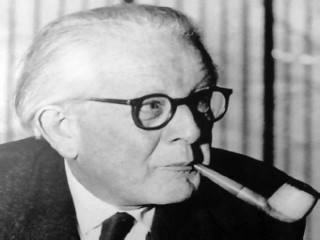
Jean Piaget biography
Date of birth : 1896-08-09
Date of death : 1980-09-17
Birthplace : Neuchatel, Switzerland
Nationality : Swiss
Category : Science and Technology
Last modified : 2011-07-20
Credited as : Psychologist, philosopher, epistemology, theory of cognitive development
Jean Piaget was born on August 9, 1896, in Neuchatel, Switzerland, the son of a historian. When he was 11, his notes on a rare part-albino sparrow were published, the first of hundreds of articles and over 50 books. His help in classifying Neuchatel's natural-history museum collection stimulated his study of mollusks (shellfish). One article, written when he was 15, led to a job offer at Geneva's natural-history museum; he declined in order to continue his education. At Neuchatel University he finished natural-science studies in 1916 and earned the doctoral degree for research on mollusks in 1918.
Piaget's godfather introduced him to philosophy. Biology (life) was thus merged with epistemology (knowledge), both basic to his later learning theories. Work in two psychological laboratories in Zurich introduced him to psychoanalysis. In Paris at the Sorbonne he studied abnormal psychology, logic, and epistemology, and in 1920 with Theodore Simon in the Binet Laboratory he developed standardized reasoning tests. Piaget thought that these quantitative tests were too rigid and saw that children's incorrect answers better revealed their qualitative thinking at various stages of development. This led to the question that he would spend the rest of his life studying: How do children learn?
After 1921 Piaget was successively director of research, assistant director, and co-director at the Jean Jacques Rousseau Institute, later part of Geneva University, where he was professor of the history of scientific thought (1929-1939). He also taught at universities in Paris, Lausanne, and Neuchatel; was chairman of the International Bureau of Education; and was a Swiss delegate to UNESCO (United Nations Economic and Scientific Committee). In 1955 he founded the Center for Genetic Epistemology in Geneva with funds from the Rockefeller Foundation and in 1956 he founded and became director of the Institute for Educational Science in Geneva.
In studying children, particularly his own, Piaget found four stages of mental growth. These are a sensory-motor stage, from birth to age 2, when mental structures concentrate on concrete objects; a pre-operational stage, from age 2 to 7, when they learn symbols in language, fantasy, play, and dreams; a concrete operational stage, from age 7 to 11, when they master classification, relationships, numbers, and ways of reasoning about them; and a formal operational stage, from age 11, when they begin to master independent thought and other people's thinking.
Piaget believed that children's concepts through at least the first three stages differ from those of adults and are based on actively exploring the environment rather than on language understanding. During these stages children learn naturally without punishment or reward. Piaget saw nature (heredity) and nurture (environment) as related and reciprocal, with neither absolute. He found children's notions about nature neither inherited nor learned but constructs of their mental structures and experiences. Mental growth takes place by integration, or learning higher ideas by assimilating lower-level ideas, and by substitution, or replacing initial explanations of an occurrence or idea with a more reasonable explanation. Children learn in stages in an upward spiral of understanding, with the same problems attacked and resolved more completely at each higher level.
Harvard psychologist Jerome Bruner and others introduced Piaget's ideas to the United States circa 1956, after which the translations of his books into English began. The post-Sputnik (1957) goal of American education, to teach children how to think, evoked further interest in Piaget's ideas. His definable stages of when children's concepts change and mature, derived from experiments with children, are currently favored over the hitherto dominant stimulus-response theory of behaviorist psychologists, who have studied animal learning.
Piaget's theories developed over years as refinements and further explanations and experiments were performed, but these refinements did not alter his basic beliefs or theories.
Piaget received honorary degrees from Oxford and Harvard universities and made many impressive guest appearances at conferences concerning childhood development and learning. He remained an elusive figure, though, preferring to avoid the spotlight. A quieter life allowed him to further develop his theories.
Piaget kept himself to a strict personal schedule that filled his entire day. He awoke every morning at four and wrote at least four publishable pages before teaching classes or attending meetings. After lunch he would take walks and ponder on his interests. "I always like to think on a problem before reading about it, " he said. He read extensively in the evening before retiring to bed. Every summer he vacationed in the Alpine Mountains of Europe and wrote extensively.
Piaget died on September 17, 1980 in Geneva, Switzerland and was remembered by the New York Times as the man whose theories were "as liberating and revolutionary as Sigmund Freud's earlier insights into the stages of human emotional life. Many have hailed him as one of the country's most creative scientific thinkers."
A synthesis of Piaget's work is in Jean Piaget and Barbel Inhelder, The Psychology of the Child (1969); Hans G. Furth, Piaget and Knowledge: Theoretical Foundations (1969), contains a brief autobiographical statement by Piaget. Studies in Cognitive Development: Essays in Honor of Jean Piaget, edited by David Elkind and John H. Flavell (1969), has an excellent opening chapter by J. McV. Hunt on the impact of Piaget's work. Piaget's obituary in the New York Times (September 17, 1980) also provides some biographical information.
















